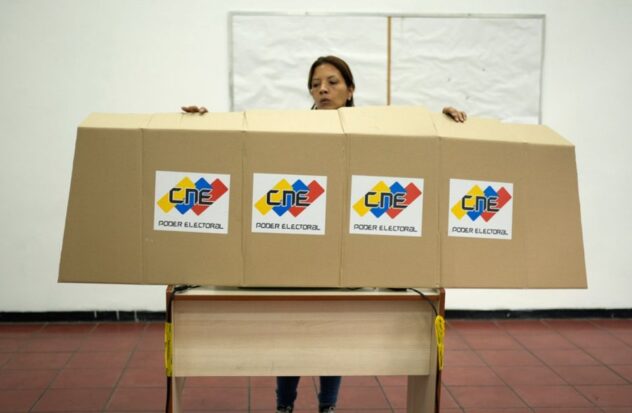BOGOTA.- From a cautious recount of votes to expressed fears of fraud, the international community was quick to react to the dictator’s electoral fraud. Nicolas Madurowho counterattacked by ordering the withdrawal of diplomatic personnel from Venezuela in ArgentinaChile, Costa Rica, Panama, Peru, Dominican Republic and Uruguay.
These seven Latin American countries, along with Ecuador and Paraguayhad considered it “essential” that there be “guarantees that the election results will fully respect the popular will expressed by the Venezuelan people at the polls,” in a joint statement published the day before.
Following the announcement by the Venezuelan electoral authority, which declared Maduro the winner with 51% of the votes over the opposition candidate, Edmundo González Urrutia (44%), the opposition’s single candidate, a wave of discredit spread across several countries, including the UN, which called for a scrutiny of the votes.
The CNE dared to declare the Maduro regime the winner even though they have not released all of the electoral records.
In a statement, the Venezuelan Foreign Ministry said the position of these seven governments “violates national sovereignty” and demanded on Monday that the diplomats of these countries accredited in Caracas also withdraw.
Governments at various levels were quick to respond:
Panama
Panamanian President José Raúl Mulino announced the withdrawal of his diplomats from Venezuela and put relations with Caracas “on hold.”
This will be the case “until a complete review of the minutes and the computer system for counting the votes is carried out to determine the genuine will of the people,” Mulino said at a press conference.
Neither country has ambassadors, so bilateral relations are maintained through chargés d’affaires.
Chile
“This is only typical of dictatorial regimes,” added Chilean Foreign Minister Alberto Van Klaveren, in statements to CNN Chile, when asked about Maduro’s decision.
“I don’t recall a measure of this nature, and what it reveals is the isolation of the Venezuelan government,” said the diplomat.
For her part, the Minister of the Interior, Carolina Tohá, who is acting as the country’s vice president while Boric is on tour in the United Arab Emirates, indicated that Chile’s efforts will focus on “ensuring that the elections that took place a few hours ago in Venezuela have a transparent, validated result and that the will of the Venezuelan people is respected.”
Peru
In a reciprocal measure, Peru ordered Venezuelan officials to leave the Andean country “within a period of no more than 72 hours” in response to “the serious and arbitrary decisions taken today by the Venezuelan regime,” it said in a statement.
Argentina
“Argentina has not broken ties with Venezuela. If they have done so, they have not yet communicated it to us,” Argentine Foreign Minister Diana Mondino clarified on the LN+ channel.
Asked about a possible break in relations, she replied that “it would be another nonsense to which Maduro is already accustoming us.”
“It makes no sense to think that by cutting ties their situation could improve,” he said.
Six of Machado’s collaborators have been sheltering in the Argentine embassy in Caracas for weeks, a situation that Mondino described as “complex” because “they don’t give authorization or they don’t answer or we don’t know what to do with the people who are refugees.”
The foreign minister stressed that “in the event that our diplomats have to leave the embassy, the Venezuelan government has the obligation to let them (the refugees) leave with our diplomats.”
“It’s really unheard of.”
Uruguay
For the government of Luis Lacalle Pou, it is an “untimely, unjustified decision by the Maduro regime in response to a legitimate concern raised by Uruguay over the electoral process,” a source from the Uruguayan Ministry of Foreign Affairs told AFP.
“In the next few hours, a decision will be made on what will happen to Ambassador Silvana Montes de Oca and the diplomatic staff in Caracas,” the source said.
Costa Rica
According to a source from the Costa Rican Foreign Ministry, the Central American country does not have any diplomatic representatives in Venezuela, so Maduro’s measure has no practical effect.
The same source says that Caracas has no diplomatic representatives, although there are two consular officials working in a building in the capital, San José, with a sign that reads “Venezuelan Embassy.”
Costa Rica suspended diplomatic relations with the Maduro government in 2020, with the withdrawal of a Costa Rican diplomatic official and the closure of the embassy and consulate, which took effect on October 1 of that year.
In 2023, consular, not diplomatic, relations were resumed, even though there are currently no diplomatic or consular personnel in Venezuela.
Costa Rica provides services from its consulates in Panama, Colombia and the Dominican Republic.
Dominican Republic
Dominican President Luis Abinader expressed in X his “deep concern about the electoral process in Venezuela, since transparency must be the basis of its legitimacy.”
The Caribbean country has not yet commented on the withdrawal of diplomatic personnel announced by Maduro.
Source: With information from AFP

